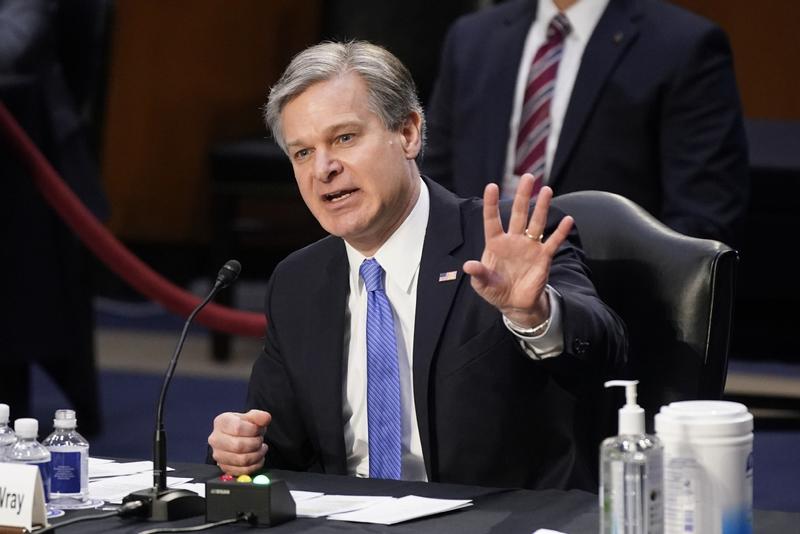 FBI Director Christopher Wray testifies before the Senate Judiciary Committee in Washington on March 2, 2021. (PATRICK SEMANSKY / AP)
FBI Director Christopher Wray testifies before the Senate Judiciary Committee in Washington on March 2, 2021. (PATRICK SEMANSKY / AP)
FBI Director Christopher Wray on Tuesday labeled the deadly Jan 6 attack on the US Capitol an act of domestic terrorism and defended the agency's sharing an intelligence warning of a possible attack on the building the night before with Capitol Police and District of Columbia police even though the report was raw and unverified.
Wray told a Senate Judiciary Committee hearing an intelligence report from the FBI's office in Norfolk, Virginia, conveyed specific threats made online against members of Congress, maps of the tunnel system under the Capitol complex and places to meet before traveling together to Washington. The Norfolk memo from Jan 5 remains undisclosed.
Officials in charge of Capitol security have indicated the FBI warning of the US Capitol attack failed to reach senior levels and was not sufficiently vetted. Capitol Police and Washington DC metropolitan police indicated in earlier hearings they did not view the material as particularly urgent because it was unconfirmed
Wray said the report, which concluded extremists were "preparing for war", was communicated in less than an hour to law enforcement partners, including the Capitol Police, the District of Columbia's Metropolitan Police Department, or MPD, and other law enforcement partners via three channels: an email the night before, verbally at an FBI command post briefing in Washington, and posted to a shared national law enforcement portal.
"Now, again, the information was raw. It was unverified. In a perfect world, we would have taken longer to be able to figure out whether it was reliable," Wray said. "But we made the judgment, our folks made the judgment to get that information to the relevant people as quickly as possible." The three methods were used "to leave as little as possible to chance", he said.
ALSO READ: Trump vows 'orderly transition' to Biden after Capitol clashes
The Norfolk report first came up publicly at a Feb 23 Senate hearing when top Capitol law enforcement officials described cascading intelligence breakdowns before the attack on the building, including failure to adequately distribute the bulletin provided by the FBI the night before the riot.
Officials in charge of Capitol security have indicated the FBI warning failed to reach senior levels and was not sufficiently vetted. Capitol Police and Washington DC metropolitan police indicated in earlier hearings they did not view the material as particularly urgent because it was unconfirmed.
Alert not forwarded
Last week, former Capitol Police chief Steven Sund told a separate Senate committee the intelligence never made it to him and others before the attack. Sund acknowledged the bulletin landed at the Capitol police agency's intelligence unit but was never forwarded.
MPD Chief Robert Contee said last week the report was not communicated with any particular sense of high alert, noting it had arrived as an email at 7 pm the evening before the insurrection.
"I would certainly think that something as violent as an insurrection in the Capitol would warrant a phone call or something," Contee told a Senate panel.
Wray said he had not seen the report until after the riot but the handling of it was typical for such intelligence.
Wray declined to disclose the cause of death of Capitol Police officer Brian Sicknick, who died following the insurrection. He did not say whether a cause of death had been determined and said the matter is still under investigation.
Authorities have been pursuing a suspect seen in riot footage spraying officers, including Sicknick, with a chemical agent. At least five people died as a result of the riot.
Wray added he is deploying intensive resources in every field office to pursue perpetrators of the attack. The FBI has arrested at least 280 people allegedly involved and charged more than 300.
READ MORE: US pursuing seditious conspiracy cases in probe of Capitol assault
Wray said the FBI has received over 270,000 digital tips from people that helped the bureau identify people who allegedly participated in the assault. "Some have even taken the painful step of turning in their friends or their family members," he said.


